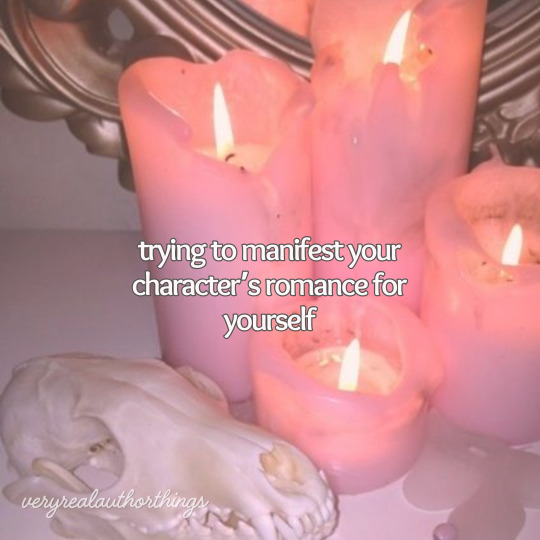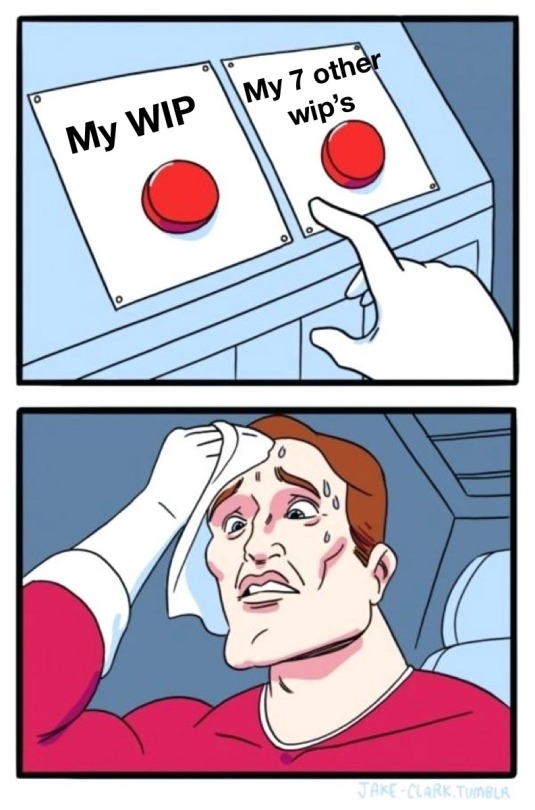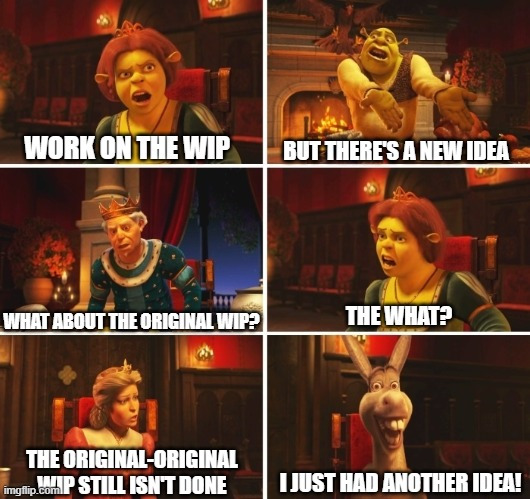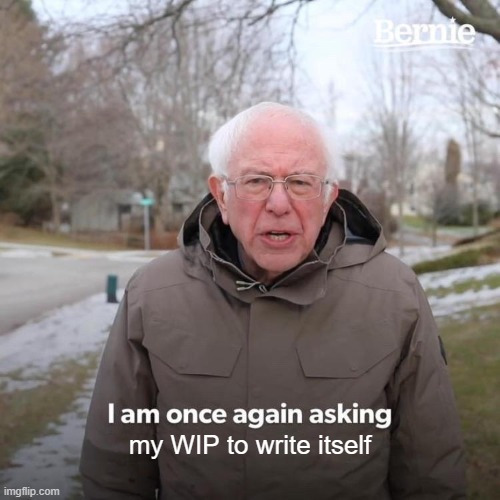#Writing Life
Text

#writing#writing memes#writing life#writing community#author memes#writers on tumblr#author life#writers#meme#veryrealauthorthings#I love my ocs#manifesting#baby witch
21 notes
·
View notes
Text

#writing#writeblr#writerblr#writers#writingblr#memes#writing life#fanfic#fanfiction#write#creative writing#fanfic writing
12K notes
·
View notes
Text
Words to Use Instead Of...
Beautiful
stunning
gorgeous
breath-taking
lovely
jaw-dropping
pretty
glowing
dazzling
exquisite
angelic
radiant
ravishing
excellent
ideal
sightly
wonderful
elegant
bewitching
captivating
mesmerizing
enthralling
magnetic
impressive
tasteful
charming
desirable
enchanting
Interesting
stricking
unusual
appealing
absorbing
srresting
gripping
riveting
alluring
amusing
exceptional
fascinating
impressive
provocative
prepossessing
exotic
readable
refreshing
entrancing
exceptional
Good
honest
upright
dutiful
enthical
pure
guiltless
lily-white
reputable
righteous
tractable
obedient
incorrupt
respectable
honorable
inculpable
irreprehensible
praiseworthy
well-behaved
uncorrupted
irreproachable
Awesome
wondrous
amazing
out-of-this-world
phenomenal
remarkable
stunning
fascinating
astounding
awe-inspiring
extraordinary
impressive
incredible
mind-blowing
mind-boggling
miraculous
stupendous
Cute
endeaing
adorable
lovable
sweet
lovely
appealing
engaging
delightful
darling charming
enchanting
attractive
bonny
cutesy
adorbs
dear
twee
Shy
modest
sel-effacing
sheepish
timid
way
reserved
unassured
skittish
chary
coy
hesitant
humble
introverted
unsocial
bashful
awkward
apprehensive
If you like my blog, buy me a coffee☕ and find me on instagram! 📸
#writer#writers#creative writing#writing#writing community#writers of tumblr#creative writers#writing inspiration#writeblr#writing tips#writers corner#writers community#poets and writers#writing advice#writing resources#writers on tumblr#writers and poets#helping writers#writing help#writing tips and tricks#how to write#writing life#let's write#resources for writers#references for writers#writers block#ao3 writer#writerscommunity#female writers#writer things
4K notes
·
View notes
Text

12K notes
·
View notes
Text
Types Of Writer’s Block (And How To Fix Them)
1. High inspiration, low motivation. You have so many ideas to write, but you just don’t have the motivation to actually get them down, and even if you can make yourself start writing it you’ll often find yourself getting distracted or disengaged in favour of imagining everything playing out
Try just bullet pointing the ideas you have instead of writing them properly, especially if you won’t remember it afterwards if you don’t. At least you’ll have the ideas ready to use when you have the motivation later on
2. Low inspiration, high motivation. You’re all prepared, you’re so pumped to write, you open your document aaaaand… three hours later, that cursor is still blinking at the top of a blank page
RIP pantsers but this is where plotting wins out; refer back to your plans and figure out where to go from here. You can also use your bullet points from the last point if this is applicable
3. No inspiration, no motivation. You don’t have any ideas, you don’t feel like writing, all in all everything is just sucky when you think about it
Make a deal with yourself; usually when I’m feeling this way I can tell myself “Okay, just write anyway for ten minutes and after that, if you really want to stop, you can stop” and then once my ten minutes is up I’ve often found my flow. Just remember that, if you still don’t want to keep writing after your ten minutes is up, don’t keep writing anyway and break your deal - it’ll be harder to make deals with yourself in future if your brain knows you don’t honour them
4. Can’t bridge the gap. When you’re stuck on this one sentence/paragraph that you just don’t know how to progress through. Until you figure it out, productivity has slowed to a halt
Mark it up, bullet point what you want to happen here, then move on. A lot of people don’t know how to keep writing after skipping a part because they don’t know exactly what happened to lead up to this moment - but you have a general idea just like you do for everything else you’re writing, and that’s enough. Just keep it generic and know you can go back to edit later, at the same time as when you’re filling in the blank. It’ll give editing you a clear purpose, if nothing else
5. Perfectionism and self-doubt. You don’t think your writing is perfect first time, so you struggle to accept that it’s anything better than a total failure. Whether or not you’re aware of the fact that this is an unrealistic standard makes no difference
Perfection is stagnant. If you write the perfect story, which would require you to turn a good story into something objective rather than subjective, then after that you’d never write again, because nothing will ever meet that standard again. That or you would only ever write the same kind of stories over and over, never growing or developing as a writer. If you’re looking back on your writing and saying “This is so bad, I hate it”, that’s generally a good thing; it means you’ve grown and improved. Maybe your current writing isn’t bad, if just matched your skill level at the time, and since then you’re able to maintain a higher standard since you’ve learned more about your craft as time went on
#writing#writers#writeblr#bookblr#book#writers on tumblr#writerscommunity#writers of tumblr#writer#how to write#on writing#creative writing#writers block#write#writing tips#writers and poets#writblr#female writers#queer writers#writer things#writer stuff#writing is hard#writing advice#writing life#writer problems#writerscreed#writersnetwork#writerblr#writersociety#writerslife
2K notes
·
View notes
Text
How to make your readers Feel emotions for Dummies
(Horror edition!) aka Make your readers Tense.
Anyway, you want to know how to make your readers angry or tense? Well... have I got some useless tips for you!
First, think about what would make you tense?
Usually, you will write about things that you enjoy, therefore your readers will most likely be similar to you, so you should take your own experiences within media and just... steal them
2. Second, Use short sentences, and add onomatopoeia
Nobody likes having to make their brain work faster. And shorter sentences will actually do that. So using it is very helpful.
For example: Nothing in the house made a noise except for something dripping from the ceiling.
Vs
Nothing in the house moved. Not a noise could be heard. Not even the rustle of wind against the walls, or even her own breath. Save for one thing. Drip, drip, drip. Something falling slowly from the rafters overhead. Then, she knew.
See? Better!
3. Next, you should make sure to dance around the word was
Trust me, it just adds that much more oomph
4. Underdescribe the important shit, Overdescribe the unimportant stuff
I don't have an example for this... uh... have a nice day
5. Make your protagonist likable
Please
6. Show your readers early on you won't hesitate to do something shitty
Like kill off a protagonist who didn't actually matter, do something drastic in the story that shows your readers you aren't fucking around
Good Luck and good day!
#creative writing#fiction writing#writing community#writer things#writerscommunity#writers on tumblr#writeblr#writing#writers#writers and poets#write#how to write#writer#writing life#author#writers block#writer stuff#on writing#writing tips#writing advice#writing help
2K notes
·
View notes
Quote
A non-writing writer is a monster courting insanity.
Franz Kafka
#writing#writers#write#writing tips#writing quotes#writing advice#amwriting#writing life#writeblr#quote#quotes
3K notes
·
View notes
Text
Do you ever just look at your characters and go what little weirdos. I love you so much. I’m going to put you through hell, but dang if you didn’t help pull me out of mine. I would do anything for these little spitfires who live in my brain.
#writer problems#writing#writers on tumblr#creative writing#writeblr#writing life#writing memes#writing community#on writing#writer memes#writerscommunity#writers and poets#writerslife#writer things#writers of tumblr
4K notes
·
View notes
Text
You know what trope I desperately need but never see? A traumatized character who's never had a day of comfort in their life trying to comfort one of their friends, and just failing. They're making things worse, their friend is angry, and they're confused and scared. Give me the angst in a moment that was supposed to be fluff.
#wrtier#writing#creative writing#writing life#writers#writers on tumblr#writeblr#writerscommunity#writing prompt#fic prompt#whump prompt
585 notes
·
View notes
Text
Showing when writing: Emotions [part 1]
Embarrassment
blushing
fidgeting
sweating
hiding their face in their hands
wide eyes
crossing their arms around their body
stutters
stammering
shifting their weight from side to side
exaggerated movements
nervous quirks appear such as picking at their nails, playing with their hair, and rocking on their heels.
avoiding eye contact
glancing or staring at random objects
stiff smiles
scratching the back of their head or neck.
subject changing
forced laughter
Anticipation
big smiles
wetting their lips
energized
constant movement
grinning
can't concentrate
clumsiness
fidgeting
questions
Awe
frozen
wide eyes
slack jaw
harsh or erratic breathing
grinning
staring
Surprise/shock
gasping
open mouth
slack jaw
wide eyes
covering their mouth with their hands
raised eyebrows
frozen
staring
stepping back
stutters or stammers
Triumph
Tilting back head and yelling out
fist pumping in the air
Jumping
Roaring
Whooping
laughter
bright smiles
grinning
Anger/Threatening
Shaking fist
Pointing
crossed arms
glares
frowning
scowling
Stabbing with finger
Slamming fist against something
Veins throbbing
Jutting out their chin
Clenched fist
Clenched jaw
flushed face
Eyebrows lowered or furrowed
squinting
Teeth bared
Wide stance
Tight-lipped smile
Rapid breathing
Sweating
aggressive stance
Flared nostrils
Puffed chest
loud voice
Nervous
lip biting
biting nails
blinking
tears
stepping back
awkward laughter
clumsiness
dry lips
dry mouth
fidgeting
darting eyes
wrapping their arms around themselves
repeatedly folding and unfolding their arms
clutching at themselves, their hip/shoulder/stomach
drawn in/furrowed brows
avoiding eye contact
jittery
pitched voice
no appetite or nervous eating so a bigger appetite
pacing
toying with things
restless
bouncing leg
rubbing at their face
scratching
sweating trembling
Hey there! I'm excited to share with you a new series I've created on Show Don't Tell. In this series, I dive deep into each emotion individually and provide a detailed list of ways to show it through body language, action, setting, and more. The first emotion we're exploring is Envy, and I promise you won't want to miss it! Check it out and let me know what you think. And if there's an emotion you'd like me to cover next, don't hesitate to leave a suggestion in the comments. Can't wait to hear from you!
#writing inspiration#writing#writers on tumblr#creative writing#writers#writeblr#writing advice#writing community#writing exercise#writing tips#writerscommunity#writerslife#writersociety#writer problems#writerblr#aspiring author#author#writers of tumblr#writing life#writers community
11K notes
·
View notes
Text
Old money names
For girls:
Adelaide - Meaning "noble and kind".
Beatrice - Meaning "bringer of happiness".
Cecilia - Meaning "blind" (associated with the patron saint of music).
Dorothea - Meaning "gift of God".
Eugenia - Meaning "well-born" or "noble".
Florence - Meaning "prosperous" or "flowering".
Georgiana - Meaning "farmer" or "earth worker".
Henrietta - Meaning "ruler of the home".
Isabella - Meaning "pledged to God" or "devoted to God".
Josephine - Meaning "God will add" or "God increases".
Lavinia - Meaning "purity" or "woman of Rome".
Matilda - Meaning "mighty in battle".
Octavia - Meaning "eighth" or "born eighth".
Prudence - Meaning "cautious" or "wise".
Rosalind - Meaning "pretty rose".
Seraphina - Meaning "ardent" or "burning one" (associated with the highest order of angels).
Theodora - Meaning "gift of God".
Victoria - Meaning "victory" or "conqueror".
Winifred - Meaning "blessed peace" or "joy and peace".
Penelope - Meaning "weaver".
For boys:
Archibald - Meaning "genuine and bold".
Bartholomew - Meaning "ploughman".
Cedric - Meaning "bounty" or "generous".
Desmond - Meaning "one from Desmond" or "gracious defender"
Edmund - Meaning "fortunate protector".
Franklin - Meaning "free landowner" .
Gregory - Meaning "watchful" or "vigilant".
Harrison - Meaning "son of Harry".
Ignatius - Meaning "fiery" or "ardent".
Jasper - Meaning "treasurer" or "bringer of treasure".
Leopold - Meaning "brave people" or "bold for the people".
Montague - Meaning "pointed hill" or "sharp peak".
Nathaniel - Meaning "gift of God" or "God has given".
Orville - Meaning "golden city" or "gold town".
Percival - Meaning "pierce the valley" or "piercing one".
Reginald - Meaning "counsel power" or "ruler's advisor".
Sebastian - Meaning "venerable" or "revered".
Theodore - Meaning "gift of God" or "God-given".
Victor - Meaning "victor" or "conqueror".
Winston - Meaning "joyful stone" or "joyful town".
If you want to read more posts about writing, please click here and give me a follow!

#writerscommunity#writers#writer things#writersociety#on writing#writblr#writers on tumblr#creative writing#writeblr#writing#writings#writers and poets#writer#write#writer problems#writerslife#ao3 writer#writers block#writing life#writing stuff#writing tools#writing community#writing tips#writing advice#writing prompt#writing inspiration#name ideas#old money#name suggestions#names
994 notes
·
View notes
Text
Emotions in writing
The following examples have been taken from the book The Emotion Thesaurus: A Writer's Guide To Character Expression by Angela Ackerman & Becca Puglisi - make sure to get the book!
Confidence
Definition: having faith in one’s own influence and ability
Physical signals:
Strong posture (shoulders back, chest out, chin high)
Walking with wide steps
Strong hygiene and personal grooming
Holding the hands loosely behind the back
Touching one’s fingertips together (tapping, forming a steeple)
A gleam in one’s eye, an inner light
Smiling, a playful grin
Winking or giving someone an easy nod
Keeping one’s hands out of the pockets
Appearing relaxed (drumming fingers against a leg, humming)
Taking up space (legs spread wide, arms loose at the sides)
Approaching people with ease
Looking others directly in the eye
Arms swinging while walking
Choosing the middle, not the sides (be it a couch or a room)
Using exaggerated movements to draw attention to oneself
A booming laugh
Showing comfort in the close proximity of others
Initiating contact
Telling jokes, adding to or steering a conversation
Hosting events (getting the guys together for a football game)
Openness when dealing with people
Appearing unbothered by what others may think
Leaning in to talk or listen
Increased physical contact, becoming touchy-feely
Running hands through one’s hair or flipping the hair back
Assuming a pose that draws attention to one’s best attributes
Wearing clothes that are flashy or dramatic
Internal sensations:
Relaxed muscles
Easy breaths
Lightness in the chest
Cues of acute or long-term confidence:
Doing or saying things outside of the norm without anxiety or concern
Obsessively talking about an achievement or material object
Reacting with anger or jealousy if one’s reputation is impugned
Bragging, showing off
Cues of suppressed confidence:
Minimizing compliments
Modesty
Changing the topic to bring others into the spotlight
Downplaying one’s own comfort level to make others feel better
Asking for opinions or advice
#emotions in writing series#writing tips#writing advice#writing help#writing tools#writing resources#emotions in writing#writing life#writingblr#creative writing#on writing#writers of tumblr#writing community#writeblr#writing references#emotions and writing
443 notes
·
View notes
Text
Scenes: The Basics🏕️
The Four Chords of a Scene
The scene is a fictional unit that comprises of the following:
Two major chords: Action + Reaction
Two minor chords: Setup + Deepening (be kept to minimum)
A "beat" is a smaller unit within a scene. You can think of this as a paragraph.
1. Action
Action happens when a character does something in order to attain his main objective. In a given scene, he has a scene purpose.
This can include: yelling, shutting the door, fighting, crying, pulling someone back, hugging....basically when your character does something or the other to alleviate the pain or take part in conflict.
2. Reaction
A reaction scene is how a Lead character feels emotionally when something happens to him.
A literary novel may feel like a lot of reaction scens because they are generally more about the interior life of a character.
Reaction is often done in "beats" where the character moves from (1) questioning himself, then (2) providing self-justification to (3) being angry beyond reason, etc.
You can put a "reaction beat" (not a whole scene!) in the middle of action so we know how the character is feeling.
3. Setup
These are things that must occur in order for subsequent scenes to make sense.
All novels need a certain amount of setup to show who the Lead is, what he does and why.
Build in some problem, however slight, to the setup scene. It can be just an alarm ringing or door suddenly opening - something that brings immediacy.
4. Deepening
Deepening is to novel as spice is to food.
This is what you mix to deepen the reader's understanding of character or setting. Make it fresh, drop it in strategically.
Deepening chords are interesting/shocking/fun and kind of in line with the overall theme, but they don't serve a particular purpose.
If you like my blog, buy me a coffee☕ and find me on instagram! 📸
#writers and poets#writing#creative writing#poets and writers#writers on tumblr#helping writers#creative writers#let's write#resources for writers#writeblr#writer#writers#writing community#writers of tumblr#writing inspiration#writing tips#writers corner#writers community#writing advice#writing resources#writing help#writing tips and tricks#how to write#writing life#references for writers
2K notes
·
View notes
Text

13K notes
·
View notes
Text
How To (Realistically) Make A Habit Of Writing
To clarify: Works with my autism. WORKS WITH MY AUTISM!!! I’ve been meeting my goals since I made them my New Year’s resolution! Anyway I’m so sick of all those ‘how to’ guides that don’t actually tell you what the process is they’re just like ‘just do it, but don’t burn yourself out, do what’s best for you!’ because you’re not telling me what I’m not supposed to be burning myself out over but okay, so I made my own. Hope this helps
1. Choose your fighter metric. What works better for you as a measurement of your progress; time spent writing or your word count? Personally I get very motivated and encouraged by seeing my word count go up and making a note of where it should be when I’m done, so I measure by that. At the same time, a lot of people are also very discouraged by their word count and it can negatively impact their motivation to write, and in that case you may be better off working from how much time you spend writing rather than where the word count is
2. Choose your starter Pokémon time frame. How often can you write before it starts to feel like a chore or a burden rather than something fun you look forward to? Many people believe that they have to write daily, but for some people this can do more harm than good. Maybe every two or three days? Weekly? Figure out what fits your schedule and go with it
3. Choose your funny third joke goal. Now that you’ve got your chosen time frame to complete your goal in, what’s a reasonable goal to aim to complete within that time frame based on the metric you chose? If your metric is your word count, how much can you reasonably and consistently write within your chosen time frame? If your metric is time spent writing, how much time can you reasonably and consistently spend writing within that time? Maybe 1000 words per week works, or maybe 10 minutes per day? The goal here is to find something that works for you and your own schedule without burning you out
4. Trial and error. Experiment with your new target and adapt it accordingly. Most people can’t consistently write 1667 words per day like you do in NaNoWriMo, so we want to avoid that and aim somewhere more reasonable. If you feel like it’s too much to do in such a short time frame, either give yourself less to do or more time to do it in. If you find yourself begrudgingly writing so often that it constantly feels more like a chore than something fun, maybe consider adapting things. And if you think that you gave yourself too much wiggle room and you could do more than this consistently, give yourself more of a challenge. Everything needs to suit you and your pace and needs
5. Run your own race. Don’t feel like you’re not accomplishing enough in comparison to others or not working fast enough to satisfy some arbitrary feeling of doubt. Everybody works at their own pace and slower work doesn’t mean worse work. You could be on one word per day and you’ll still see consistent results, which is still one word per day more than you could originally count on. All progress is progress, regardless of its speed
#habits#writing habits#writing#writers#writeblr#bookblr#book#writers on tumblr#writerscommunity#my writing#writers of tumblr#writer#how to write#on writing#creative writing#write#writers and poets#writblr#writer things#writing tips#writerscreed#writing is hard#writing advice#writing life#writer problems#writer stuff#female writers#queer writers#writersnetwork#writerblr
2K notes
·
View notes
